Business Environment Report: Jamie Oliver Restaurant Analysis
VerifiedAdded on 2021/08/10
|11
|3591
|271
Report
AI Summary
This report provides a comprehensive analysis of the business environment surrounding Jamie Oliver's restaurant chain. It begins by identifying the purpose of different organizational types and assessing how well Jamie Oliver meets the expectations of its stakeholders, including customers, employees, shareholders, the government, and society. The report then delves into the UK's economic system, examining the impact of fiscal and monetary policies, competition policies, and regulatory mechanisms on the business. Furthermore, it explores how market structures influence pricing and production decisions, market forces, and the cultural environment of Jamie Oliver. The analysis extends to the significance of international trade, global factors, and European Union policies on UK businesses. The report highlights Jamie Oliver's mission, vision, and both short-term and long-term objectives, emphasizing its commitment to quality food, customer service, and social responsibility. The report concludes by summarizing the key findings and implications for the restaurant's operations and future strategies.
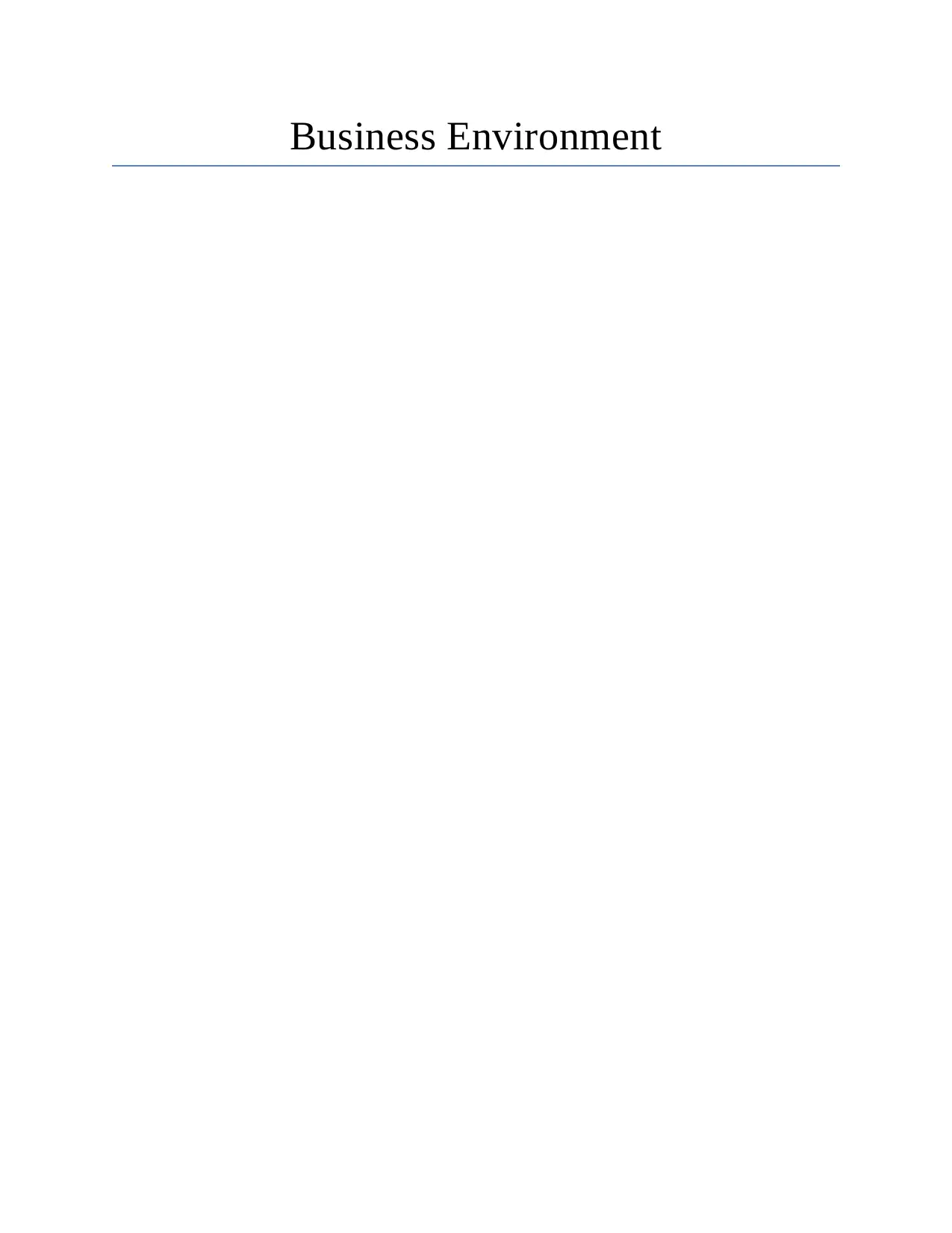
Business Environment
Paraphrase This Document
Need a fresh take? Get an instant paraphrase of this document with our AI Paraphraser
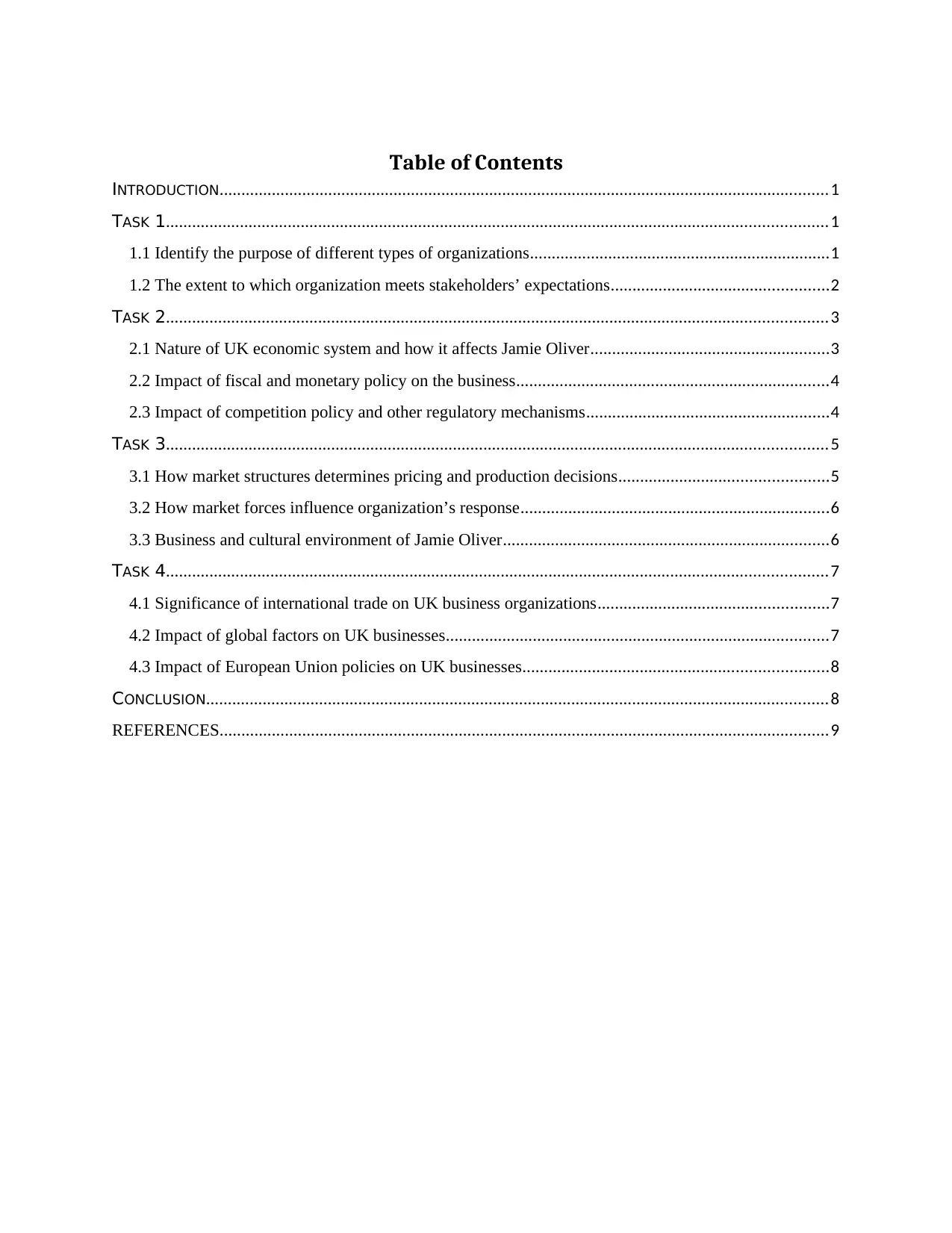
Table of Contents
INTRODUCTION............................................................................................................................................1
TASK 1........................................................................................................................................................1
1.1 Identify the purpose of different types of organizations.....................................................................1
1.2 The extent to which organization meets stakeholders’ expectations..................................................2
TASK 2........................................................................................................................................................3
2.1 Nature of UK economic system and how it affects Jamie Oliver.......................................................3
2.2 Impact of fiscal and monetary policy on the business........................................................................4
2.3 Impact of competition policy and other regulatory mechanisms........................................................4
TASK 3........................................................................................................................................................5
3.1 How market structures determines pricing and production decisions................................................5
3.2 How market forces influence organization’s response.......................................................................6
3.3 Business and cultural environment of Jamie Oliver...........................................................................6
TASK 4........................................................................................................................................................7
4.1 Significance of international trade on UK business organizations.....................................................7
4.2 Impact of global factors on UK businesses........................................................................................7
4.3 Impact of European Union policies on UK businesses......................................................................8
CONCLUSION...............................................................................................................................................8
REFERENCES............................................................................................................................................9
INTRODUCTION............................................................................................................................................1
TASK 1........................................................................................................................................................1
1.1 Identify the purpose of different types of organizations.....................................................................1
1.2 The extent to which organization meets stakeholders’ expectations..................................................2
TASK 2........................................................................................................................................................3
2.1 Nature of UK economic system and how it affects Jamie Oliver.......................................................3
2.2 Impact of fiscal and monetary policy on the business........................................................................4
2.3 Impact of competition policy and other regulatory mechanisms........................................................4
TASK 3........................................................................................................................................................5
3.1 How market structures determines pricing and production decisions................................................5
3.2 How market forces influence organization’s response.......................................................................6
3.3 Business and cultural environment of Jamie Oliver...........................................................................6
TASK 4........................................................................................................................................................7
4.1 Significance of international trade on UK business organizations.....................................................7
4.2 Impact of global factors on UK businesses........................................................................................7
4.3 Impact of European Union policies on UK businesses......................................................................8
CONCLUSION...............................................................................................................................................8
REFERENCES............................................................................................................................................9
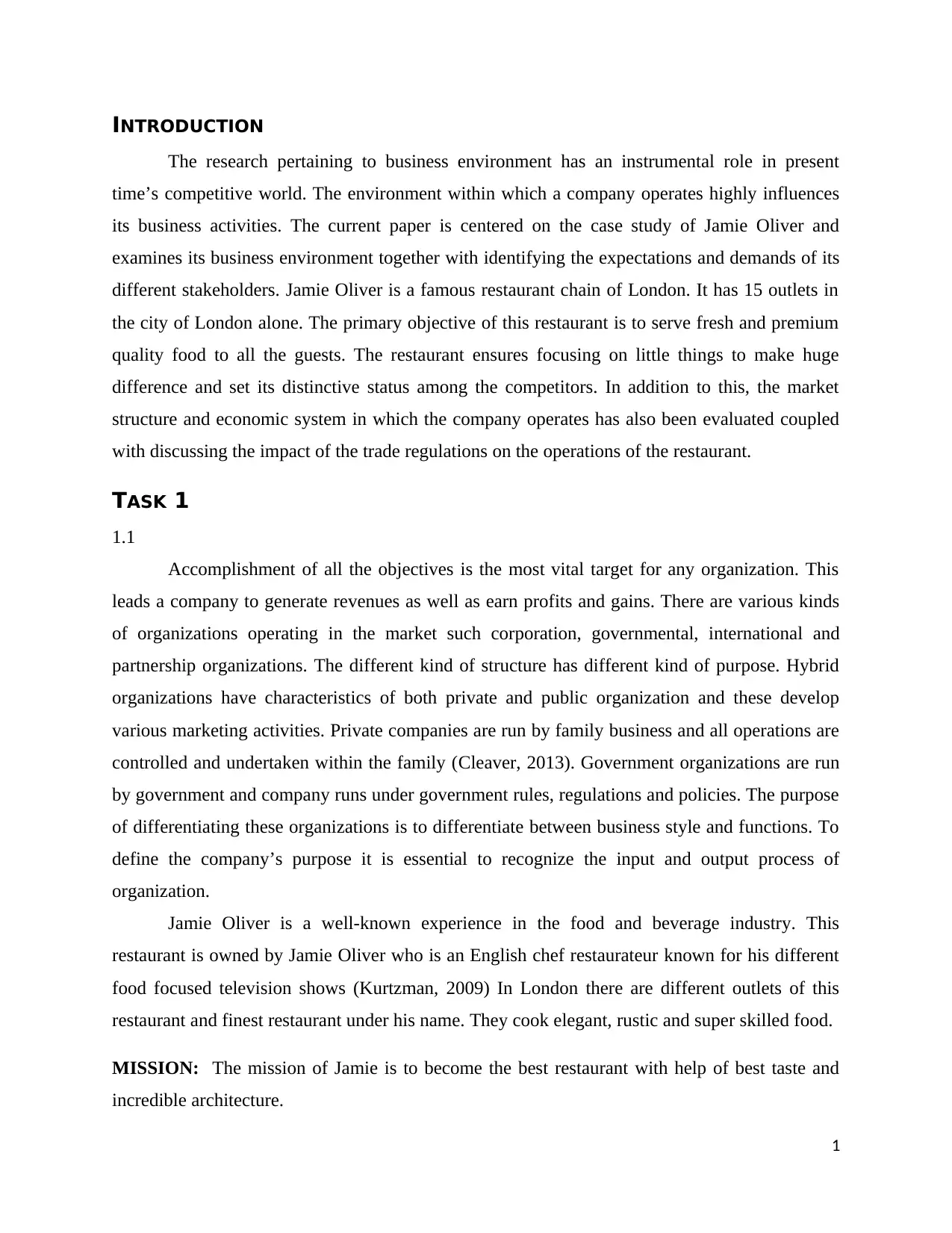
INTRODUCTION
The research pertaining to business environment has an instrumental role in present
time’s competitive world. The environment within which a company operates highly influences
its business activities. The current paper is centered on the case study of Jamie Oliver and
examines its business environment together with identifying the expectations and demands of its
different stakeholders. Jamie Oliver is a famous restaurant chain of London. It has 15 outlets in
the city of London alone. The primary objective of this restaurant is to serve fresh and premium
quality food to all the guests. The restaurant ensures focusing on little things to make huge
difference and set its distinctive status among the competitors. In addition to this, the market
structure and economic system in which the company operates has also been evaluated coupled
with discussing the impact of the trade regulations on the operations of the restaurant.
TASK 1
1.1
Accomplishment of all the objectives is the most vital target for any organization. This
leads a company to generate revenues as well as earn profits and gains. There are various kinds
of organizations operating in the market such corporation, governmental, international and
partnership organizations. The different kind of structure has different kind of purpose. Hybrid
organizations have characteristics of both private and public organization and these develop
various marketing activities. Private companies are run by family business and all operations are
controlled and undertaken within the family (Cleaver, 2013). Government organizations are run
by government and company runs under government rules, regulations and policies. The purpose
of differentiating these organizations is to differentiate between business style and functions. To
define the company’s purpose it is essential to recognize the input and output process of
organization.
Jamie Oliver is a well-known experience in the food and beverage industry. This
restaurant is owned by Jamie Oliver who is an English chef restaurateur known for his different
food focused television shows (Kurtzman, 2009) In London there are different outlets of this
restaurant and finest restaurant under his name. They cook elegant, rustic and super skilled food.
MISSION: The mission of Jamie is to become the best restaurant with help of best taste and
incredible architecture.
1
The research pertaining to business environment has an instrumental role in present
time’s competitive world. The environment within which a company operates highly influences
its business activities. The current paper is centered on the case study of Jamie Oliver and
examines its business environment together with identifying the expectations and demands of its
different stakeholders. Jamie Oliver is a famous restaurant chain of London. It has 15 outlets in
the city of London alone. The primary objective of this restaurant is to serve fresh and premium
quality food to all the guests. The restaurant ensures focusing on little things to make huge
difference and set its distinctive status among the competitors. In addition to this, the market
structure and economic system in which the company operates has also been evaluated coupled
with discussing the impact of the trade regulations on the operations of the restaurant.
TASK 1
1.1
Accomplishment of all the objectives is the most vital target for any organization. This
leads a company to generate revenues as well as earn profits and gains. There are various kinds
of organizations operating in the market such corporation, governmental, international and
partnership organizations. The different kind of structure has different kind of purpose. Hybrid
organizations have characteristics of both private and public organization and these develop
various marketing activities. Private companies are run by family business and all operations are
controlled and undertaken within the family (Cleaver, 2013). Government organizations are run
by government and company runs under government rules, regulations and policies. The purpose
of differentiating these organizations is to differentiate between business style and functions. To
define the company’s purpose it is essential to recognize the input and output process of
organization.
Jamie Oliver is a well-known experience in the food and beverage industry. This
restaurant is owned by Jamie Oliver who is an English chef restaurateur known for his different
food focused television shows (Kurtzman, 2009) In London there are different outlets of this
restaurant and finest restaurant under his name. They cook elegant, rustic and super skilled food.
MISSION: The mission of Jamie is to become the best restaurant with help of best taste and
incredible architecture.
1
⊘ This is a preview!⊘
Do you want full access?
Subscribe today to unlock all pages.

Trusted by 1+ million students worldwide
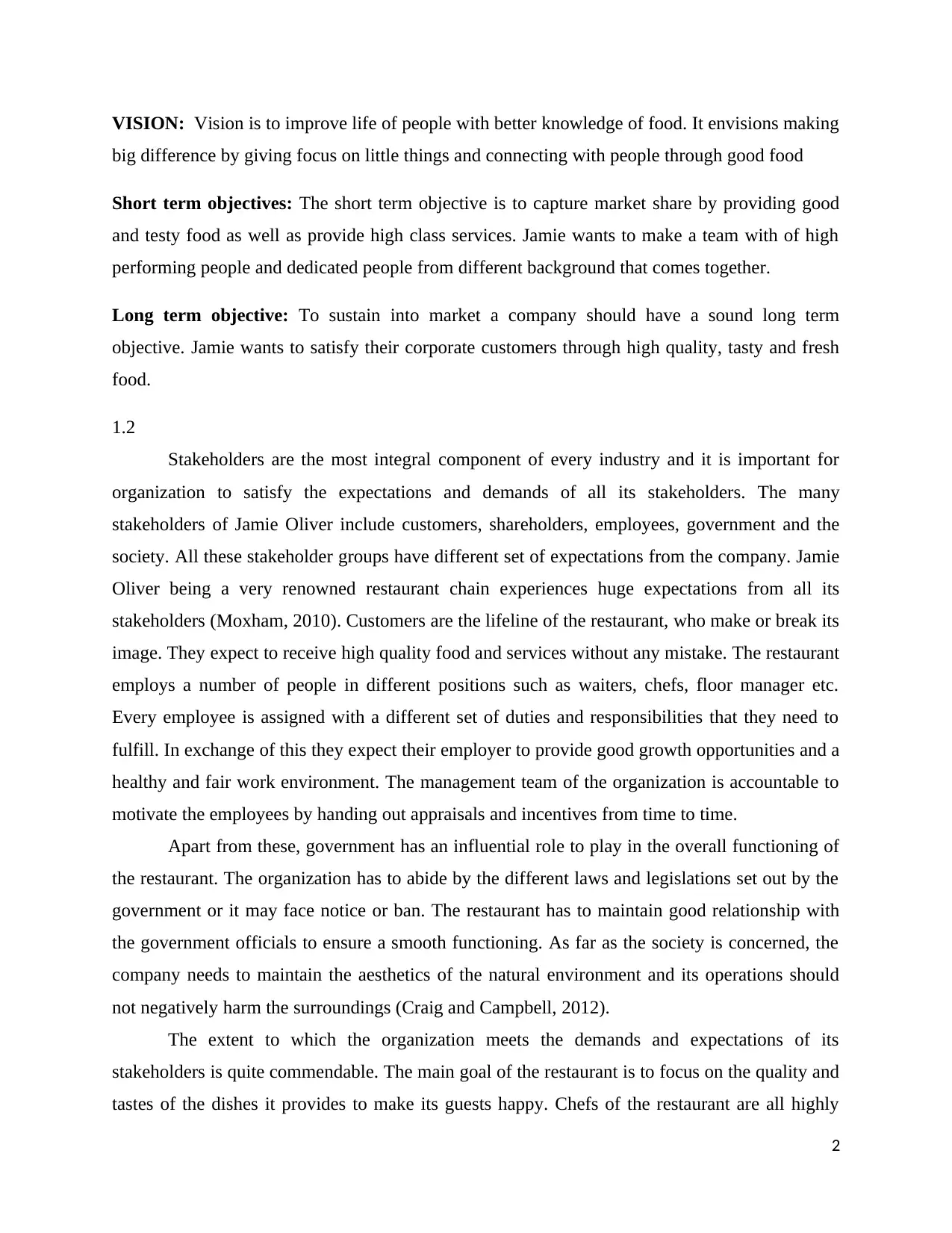
VISION: Vision is to improve life of people with better knowledge of food. It envisions making
big difference by giving focus on little things and connecting with people through good food
Short term objectives: The short term objective is to capture market share by providing good
and testy food as well as provide high class services. Jamie wants to make a team with of high
performing people and dedicated people from different background that comes together.
Long term objective: To sustain into market a company should have a sound long term
objective. Jamie wants to satisfy their corporate customers through high quality, tasty and fresh
food.
1.2
Stakeholders are the most integral component of every industry and it is important for
organization to satisfy the expectations and demands of all its stakeholders. The many
stakeholders of Jamie Oliver include customers, shareholders, employees, government and the
society. All these stakeholder groups have different set of expectations from the company. Jamie
Oliver being a very renowned restaurant chain experiences huge expectations from all its
stakeholders (Moxham, 2010). Customers are the lifeline of the restaurant, who make or break its
image. They expect to receive high quality food and services without any mistake. The restaurant
employs a number of people in different positions such as waiters, chefs, floor manager etc.
Every employee is assigned with a different set of duties and responsibilities that they need to
fulfill. In exchange of this they expect their employer to provide good growth opportunities and a
healthy and fair work environment. The management team of the organization is accountable to
motivate the employees by handing out appraisals and incentives from time to time.
Apart from these, government has an influential role to play in the overall functioning of
the restaurant. The organization has to abide by the different laws and legislations set out by the
government or it may face notice or ban. The restaurant has to maintain good relationship with
the government officials to ensure a smooth functioning. As far as the society is concerned, the
company needs to maintain the aesthetics of the natural environment and its operations should
not negatively harm the surroundings (Craig and Campbell, 2012).
The extent to which the organization meets the demands and expectations of its
stakeholders is quite commendable. The main goal of the restaurant is to focus on the quality and
tastes of the dishes it provides to make its guests happy. Chefs of the restaurant are all highly
2
big difference by giving focus on little things and connecting with people through good food
Short term objectives: The short term objective is to capture market share by providing good
and testy food as well as provide high class services. Jamie wants to make a team with of high
performing people and dedicated people from different background that comes together.
Long term objective: To sustain into market a company should have a sound long term
objective. Jamie wants to satisfy their corporate customers through high quality, tasty and fresh
food.
1.2
Stakeholders are the most integral component of every industry and it is important for
organization to satisfy the expectations and demands of all its stakeholders. The many
stakeholders of Jamie Oliver include customers, shareholders, employees, government and the
society. All these stakeholder groups have different set of expectations from the company. Jamie
Oliver being a very renowned restaurant chain experiences huge expectations from all its
stakeholders (Moxham, 2010). Customers are the lifeline of the restaurant, who make or break its
image. They expect to receive high quality food and services without any mistake. The restaurant
employs a number of people in different positions such as waiters, chefs, floor manager etc.
Every employee is assigned with a different set of duties and responsibilities that they need to
fulfill. In exchange of this they expect their employer to provide good growth opportunities and a
healthy and fair work environment. The management team of the organization is accountable to
motivate the employees by handing out appraisals and incentives from time to time.
Apart from these, government has an influential role to play in the overall functioning of
the restaurant. The organization has to abide by the different laws and legislations set out by the
government or it may face notice or ban. The restaurant has to maintain good relationship with
the government officials to ensure a smooth functioning. As far as the society is concerned, the
company needs to maintain the aesthetics of the natural environment and its operations should
not negatively harm the surroundings (Craig and Campbell, 2012).
The extent to which the organization meets the demands and expectations of its
stakeholders is quite commendable. The main goal of the restaurant is to focus on the quality and
tastes of the dishes it provides to make its guests happy. Chefs of the restaurant are all highly
2
Paraphrase This Document
Need a fresh take? Get an instant paraphrase of this document with our AI Paraphraser
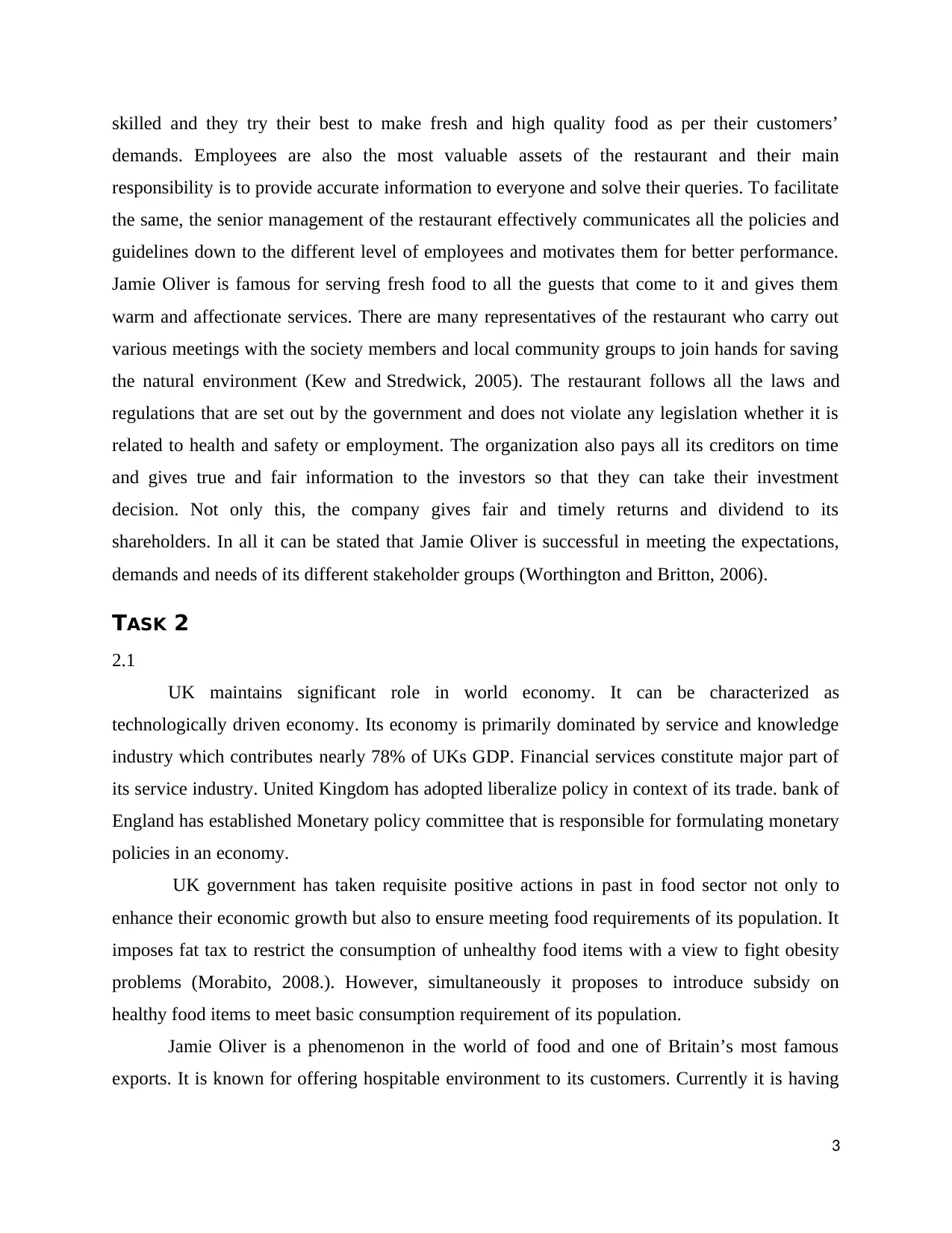
skilled and they try their best to make fresh and high quality food as per their customers’
demands. Employees are also the most valuable assets of the restaurant and their main
responsibility is to provide accurate information to everyone and solve their queries. To facilitate
the same, the senior management of the restaurant effectively communicates all the policies and
guidelines down to the different level of employees and motivates them for better performance.
Jamie Oliver is famous for serving fresh food to all the guests that come to it and gives them
warm and affectionate services. There are many representatives of the restaurant who carry out
various meetings with the society members and local community groups to join hands for saving
the natural environment (Kew and Stredwick, 2005). The restaurant follows all the laws and
regulations that are set out by the government and does not violate any legislation whether it is
related to health and safety or employment. The organization also pays all its creditors on time
and gives true and fair information to the investors so that they can take their investment
decision. Not only this, the company gives fair and timely returns and dividend to its
shareholders. In all it can be stated that Jamie Oliver is successful in meeting the expectations,
demands and needs of its different stakeholder groups (Worthington and Britton, 2006).
TASK 2
2.1
UK maintains significant role in world economy. It can be characterized as
technologically driven economy. Its economy is primarily dominated by service and knowledge
industry which contributes nearly 78% of UKs GDP. Financial services constitute major part of
its service industry. United Kingdom has adopted liberalize policy in context of its trade. bank of
England has established Monetary policy committee that is responsible for formulating monetary
policies in an economy.
UK government has taken requisite positive actions in past in food sector not only to
enhance their economic growth but also to ensure meeting food requirements of its population. It
imposes fat tax to restrict the consumption of unhealthy food items with a view to fight obesity
problems (Morabito, 2008.). However, simultaneously it proposes to introduce subsidy on
healthy food items to meet basic consumption requirement of its population.
Jamie Oliver is a phenomenon in the world of food and one of Britain’s most famous
exports. It is known for offering hospitable environment to its customers. Currently it is having
3
demands. Employees are also the most valuable assets of the restaurant and their main
responsibility is to provide accurate information to everyone and solve their queries. To facilitate
the same, the senior management of the restaurant effectively communicates all the policies and
guidelines down to the different level of employees and motivates them for better performance.
Jamie Oliver is famous for serving fresh food to all the guests that come to it and gives them
warm and affectionate services. There are many representatives of the restaurant who carry out
various meetings with the society members and local community groups to join hands for saving
the natural environment (Kew and Stredwick, 2005). The restaurant follows all the laws and
regulations that are set out by the government and does not violate any legislation whether it is
related to health and safety or employment. The organization also pays all its creditors on time
and gives true and fair information to the investors so that they can take their investment
decision. Not only this, the company gives fair and timely returns and dividend to its
shareholders. In all it can be stated that Jamie Oliver is successful in meeting the expectations,
demands and needs of its different stakeholder groups (Worthington and Britton, 2006).
TASK 2
2.1
UK maintains significant role in world economy. It can be characterized as
technologically driven economy. Its economy is primarily dominated by service and knowledge
industry which contributes nearly 78% of UKs GDP. Financial services constitute major part of
its service industry. United Kingdom has adopted liberalize policy in context of its trade. bank of
England has established Monetary policy committee that is responsible for formulating monetary
policies in an economy.
UK government has taken requisite positive actions in past in food sector not only to
enhance their economic growth but also to ensure meeting food requirements of its population. It
imposes fat tax to restrict the consumption of unhealthy food items with a view to fight obesity
problems (Morabito, 2008.). However, simultaneously it proposes to introduce subsidy on
healthy food items to meet basic consumption requirement of its population.
Jamie Oliver is a phenomenon in the world of food and one of Britain’s most famous
exports. It is known for offering hospitable environment to its customers. Currently it is having
3
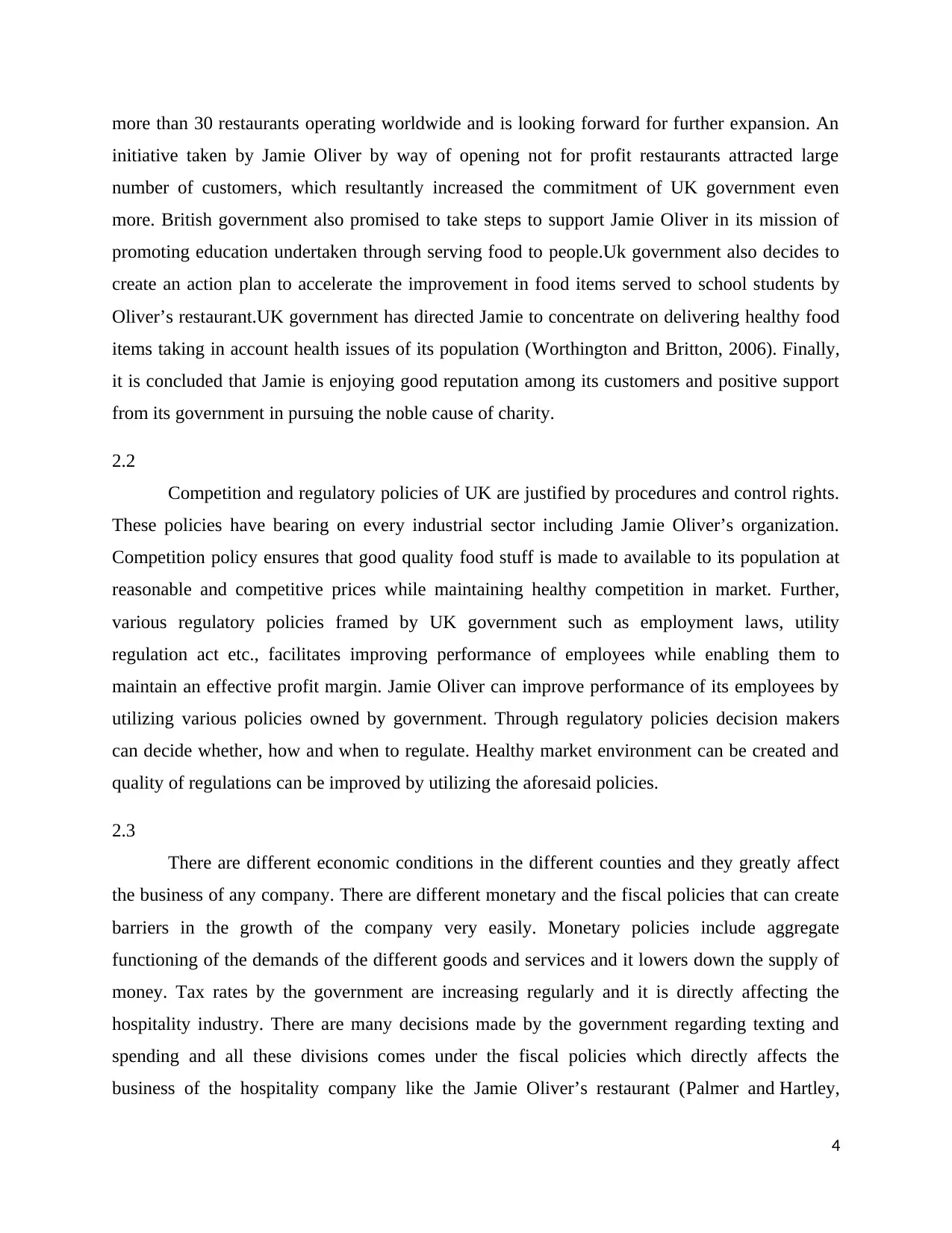
more than 30 restaurants operating worldwide and is looking forward for further expansion. An
initiative taken by Jamie Oliver by way of opening not for profit restaurants attracted large
number of customers, which resultantly increased the commitment of UK government even
more. British government also promised to take steps to support Jamie Oliver in its mission of
promoting education undertaken through serving food to people.Uk government also decides to
create an action plan to accelerate the improvement in food items served to school students by
Oliver’s restaurant.UK government has directed Jamie to concentrate on delivering healthy food
items taking in account health issues of its population (Worthington and Britton, 2006). Finally,
it is concluded that Jamie is enjoying good reputation among its customers and positive support
from its government in pursuing the noble cause of charity.
2.2
Competition and regulatory policies of UK are justified by procedures and control rights.
These policies have bearing on every industrial sector including Jamie Oliver’s organization.
Competition policy ensures that good quality food stuff is made to available to its population at
reasonable and competitive prices while maintaining healthy competition in market. Further,
various regulatory policies framed by UK government such as employment laws, utility
regulation act etc., facilitates improving performance of employees while enabling them to
maintain an effective profit margin. Jamie Oliver can improve performance of its employees by
utilizing various policies owned by government. Through regulatory policies decision makers
can decide whether, how and when to regulate. Healthy market environment can be created and
quality of regulations can be improved by utilizing the aforesaid policies.
2.3
There are different economic conditions in the different counties and they greatly affect
the business of any company. There are different monetary and the fiscal policies that can create
barriers in the growth of the company very easily. Monetary policies include aggregate
functioning of the demands of the different goods and services and it lowers down the supply of
money. Tax rates by the government are increasing regularly and it is directly affecting the
hospitality industry. There are many decisions made by the government regarding texting and
spending and all these divisions comes under the fiscal policies which directly affects the
business of the hospitality company like the Jamie Oliver’s restaurant (Palmer and Hartley,
4
initiative taken by Jamie Oliver by way of opening not for profit restaurants attracted large
number of customers, which resultantly increased the commitment of UK government even
more. British government also promised to take steps to support Jamie Oliver in its mission of
promoting education undertaken through serving food to people.Uk government also decides to
create an action plan to accelerate the improvement in food items served to school students by
Oliver’s restaurant.UK government has directed Jamie to concentrate on delivering healthy food
items taking in account health issues of its population (Worthington and Britton, 2006). Finally,
it is concluded that Jamie is enjoying good reputation among its customers and positive support
from its government in pursuing the noble cause of charity.
2.2
Competition and regulatory policies of UK are justified by procedures and control rights.
These policies have bearing on every industrial sector including Jamie Oliver’s organization.
Competition policy ensures that good quality food stuff is made to available to its population at
reasonable and competitive prices while maintaining healthy competition in market. Further,
various regulatory policies framed by UK government such as employment laws, utility
regulation act etc., facilitates improving performance of employees while enabling them to
maintain an effective profit margin. Jamie Oliver can improve performance of its employees by
utilizing various policies owned by government. Through regulatory policies decision makers
can decide whether, how and when to regulate. Healthy market environment can be created and
quality of regulations can be improved by utilizing the aforesaid policies.
2.3
There are different economic conditions in the different counties and they greatly affect
the business of any company. There are different monetary and the fiscal policies that can create
barriers in the growth of the company very easily. Monetary policies include aggregate
functioning of the demands of the different goods and services and it lowers down the supply of
money. Tax rates by the government are increasing regularly and it is directly affecting the
hospitality industry. There are many decisions made by the government regarding texting and
spending and all these divisions comes under the fiscal policies which directly affects the
business of the hospitality company like the Jamie Oliver’s restaurant (Palmer and Hartley,
4
⊘ This is a preview!⊘
Do you want full access?
Subscribe today to unlock all pages.

Trusted by 1+ million students worldwide
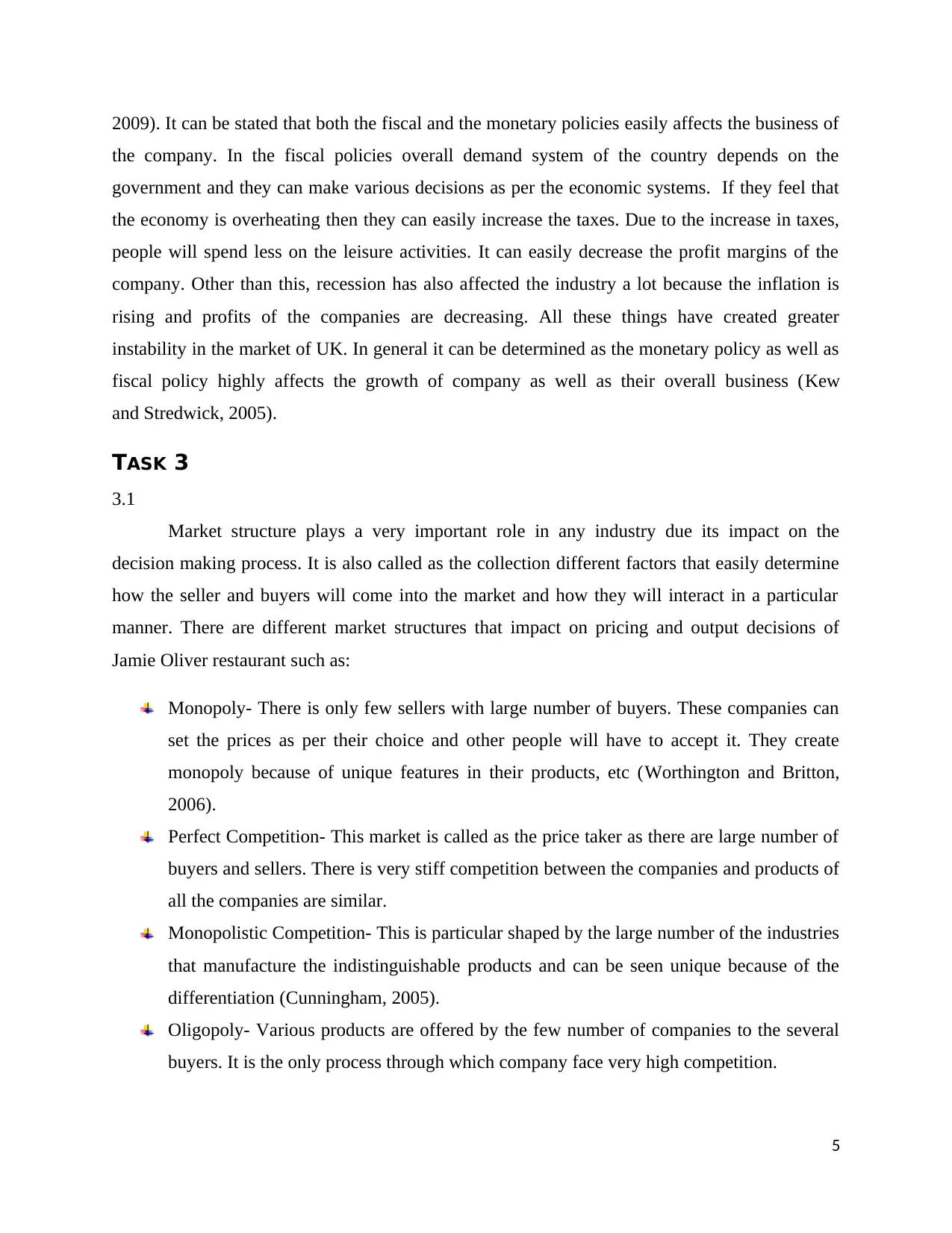
2009). It can be stated that both the fiscal and the monetary policies easily affects the business of
the company. In the fiscal policies overall demand system of the country depends on the
government and they can make various decisions as per the economic systems. If they feel that
the economy is overheating then they can easily increase the taxes. Due to the increase in taxes,
people will spend less on the leisure activities. It can easily decrease the profit margins of the
company. Other than this, recession has also affected the industry a lot because the inflation is
rising and profits of the companies are decreasing. All these things have created greater
instability in the market of UK. In general it can be determined as the monetary policy as well as
fiscal policy highly affects the growth of company as well as their overall business (Kew
and Stredwick, 2005).
TASK 3
3.1
Market structure plays a very important role in any industry due its impact on the
decision making process. It is also called as the collection different factors that easily determine
how the seller and buyers will come into the market and how they will interact in a particular
manner. There are different market structures that impact on pricing and output decisions of
Jamie Oliver restaurant such as:
Monopoly- There is only few sellers with large number of buyers. These companies can
set the prices as per their choice and other people will have to accept it. They create
monopoly because of unique features in their products, etc (Worthington and Britton,
2006).
Perfect Competition- This market is called as the price taker as there are large number of
buyers and sellers. There is very stiff competition between the companies and products of
all the companies are similar.
Monopolistic Competition- This is particular shaped by the large number of the industries
that manufacture the indistinguishable products and can be seen unique because of the
differentiation (Cunningham, 2005).
Oligopoly- Various products are offered by the few number of companies to the several
buyers. It is the only process through which company face very high competition.
5
the company. In the fiscal policies overall demand system of the country depends on the
government and they can make various decisions as per the economic systems. If they feel that
the economy is overheating then they can easily increase the taxes. Due to the increase in taxes,
people will spend less on the leisure activities. It can easily decrease the profit margins of the
company. Other than this, recession has also affected the industry a lot because the inflation is
rising and profits of the companies are decreasing. All these things have created greater
instability in the market of UK. In general it can be determined as the monetary policy as well as
fiscal policy highly affects the growth of company as well as their overall business (Kew
and Stredwick, 2005).
TASK 3
3.1
Market structure plays a very important role in any industry due its impact on the
decision making process. It is also called as the collection different factors that easily determine
how the seller and buyers will come into the market and how they will interact in a particular
manner. There are different market structures that impact on pricing and output decisions of
Jamie Oliver restaurant such as:
Monopoly- There is only few sellers with large number of buyers. These companies can
set the prices as per their choice and other people will have to accept it. They create
monopoly because of unique features in their products, etc (Worthington and Britton,
2006).
Perfect Competition- This market is called as the price taker as there are large number of
buyers and sellers. There is very stiff competition between the companies and products of
all the companies are similar.
Monopolistic Competition- This is particular shaped by the large number of the industries
that manufacture the indistinguishable products and can be seen unique because of the
differentiation (Cunningham, 2005).
Oligopoly- Various products are offered by the few number of companies to the several
buyers. It is the only process through which company face very high competition.
5
Paraphrase This Document
Need a fresh take? Get an instant paraphrase of this document with our AI Paraphraser
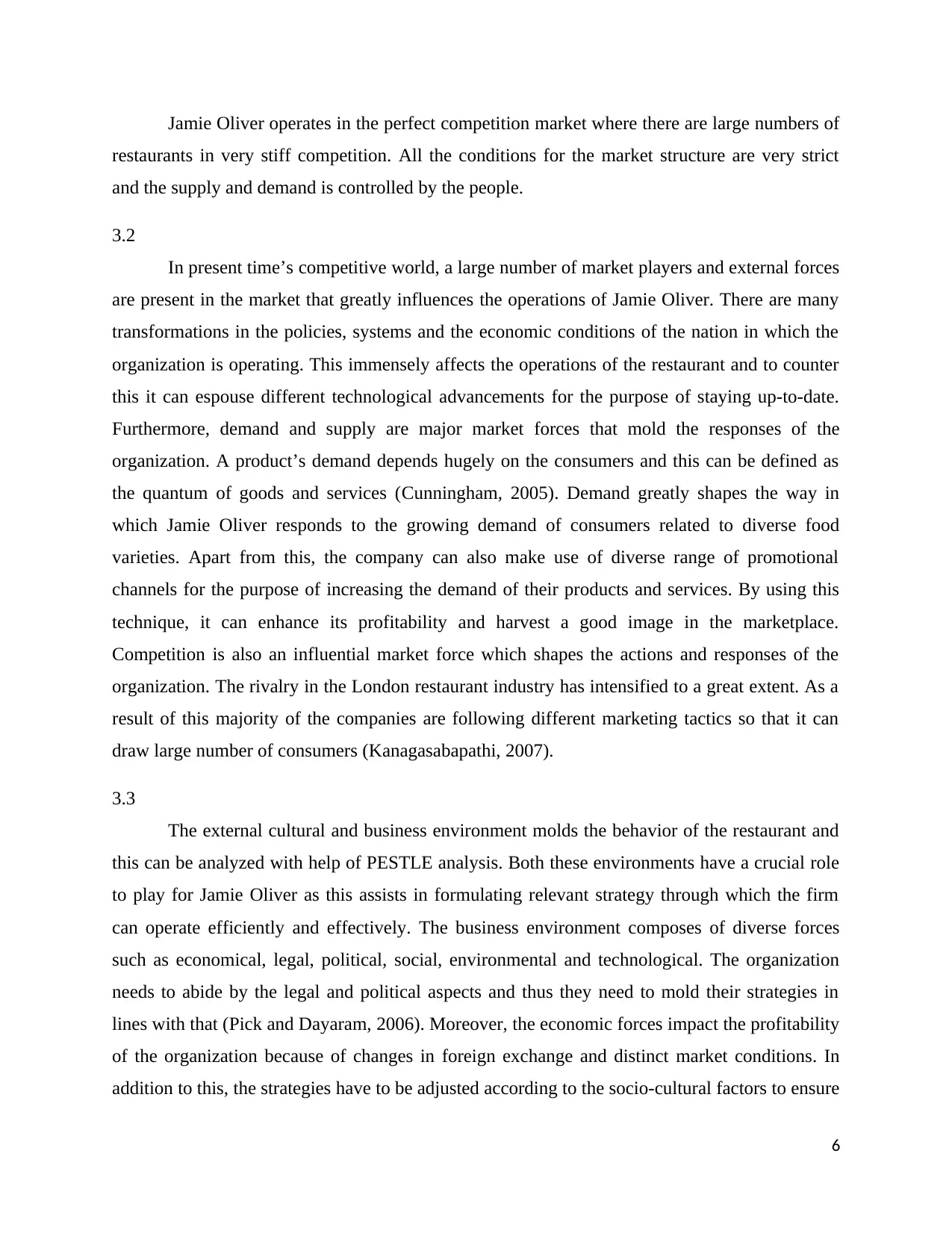
Jamie Oliver operates in the perfect competition market where there are large numbers of
restaurants in very stiff competition. All the conditions for the market structure are very strict
and the supply and demand is controlled by the people.
3.2
In present time’s competitive world, a large number of market players and external forces
are present in the market that greatly influences the operations of Jamie Oliver. There are many
transformations in the policies, systems and the economic conditions of the nation in which the
organization is operating. This immensely affects the operations of the restaurant and to counter
this it can espouse different technological advancements for the purpose of staying up-to-date.
Furthermore, demand and supply are major market forces that mold the responses of the
organization. A product’s demand depends hugely on the consumers and this can be defined as
the quantum of goods and services (Cunningham, 2005). Demand greatly shapes the way in
which Jamie Oliver responds to the growing demand of consumers related to diverse food
varieties. Apart from this, the company can also make use of diverse range of promotional
channels for the purpose of increasing the demand of their products and services. By using this
technique, it can enhance its profitability and harvest a good image in the marketplace.
Competition is also an influential market force which shapes the actions and responses of the
organization. The rivalry in the London restaurant industry has intensified to a great extent. As a
result of this majority of the companies are following different marketing tactics so that it can
draw large number of consumers (Kanagasabapathi, 2007).
3.3
The external cultural and business environment molds the behavior of the restaurant and
this can be analyzed with help of PESTLE analysis. Both these environments have a crucial role
to play for Jamie Oliver as this assists in formulating relevant strategy through which the firm
can operate efficiently and effectively. The business environment composes of diverse forces
such as economical, legal, political, social, environmental and technological. The organization
needs to abide by the legal and political aspects and thus they need to mold their strategies in
lines with that (Pick and Dayaram, 2006). Moreover, the economic forces impact the profitability
of the organization because of changes in foreign exchange and distinct market conditions. In
addition to this, the strategies have to be adjusted according to the socio-cultural factors to ensure
6
restaurants in very stiff competition. All the conditions for the market structure are very strict
and the supply and demand is controlled by the people.
3.2
In present time’s competitive world, a large number of market players and external forces
are present in the market that greatly influences the operations of Jamie Oliver. There are many
transformations in the policies, systems and the economic conditions of the nation in which the
organization is operating. This immensely affects the operations of the restaurant and to counter
this it can espouse different technological advancements for the purpose of staying up-to-date.
Furthermore, demand and supply are major market forces that mold the responses of the
organization. A product’s demand depends hugely on the consumers and this can be defined as
the quantum of goods and services (Cunningham, 2005). Demand greatly shapes the way in
which Jamie Oliver responds to the growing demand of consumers related to diverse food
varieties. Apart from this, the company can also make use of diverse range of promotional
channels for the purpose of increasing the demand of their products and services. By using this
technique, it can enhance its profitability and harvest a good image in the marketplace.
Competition is also an influential market force which shapes the actions and responses of the
organization. The rivalry in the London restaurant industry has intensified to a great extent. As a
result of this majority of the companies are following different marketing tactics so that it can
draw large number of consumers (Kanagasabapathi, 2007).
3.3
The external cultural and business environment molds the behavior of the restaurant and
this can be analyzed with help of PESTLE analysis. Both these environments have a crucial role
to play for Jamie Oliver as this assists in formulating relevant strategy through which the firm
can operate efficiently and effectively. The business environment composes of diverse forces
such as economical, legal, political, social, environmental and technological. The organization
needs to abide by the legal and political aspects and thus they need to mold their strategies in
lines with that (Pick and Dayaram, 2006). Moreover, the economic forces impact the profitability
of the organization because of changes in foreign exchange and distinct market conditions. In
addition to this, the strategies have to be adjusted according to the socio-cultural factors to ensure
6
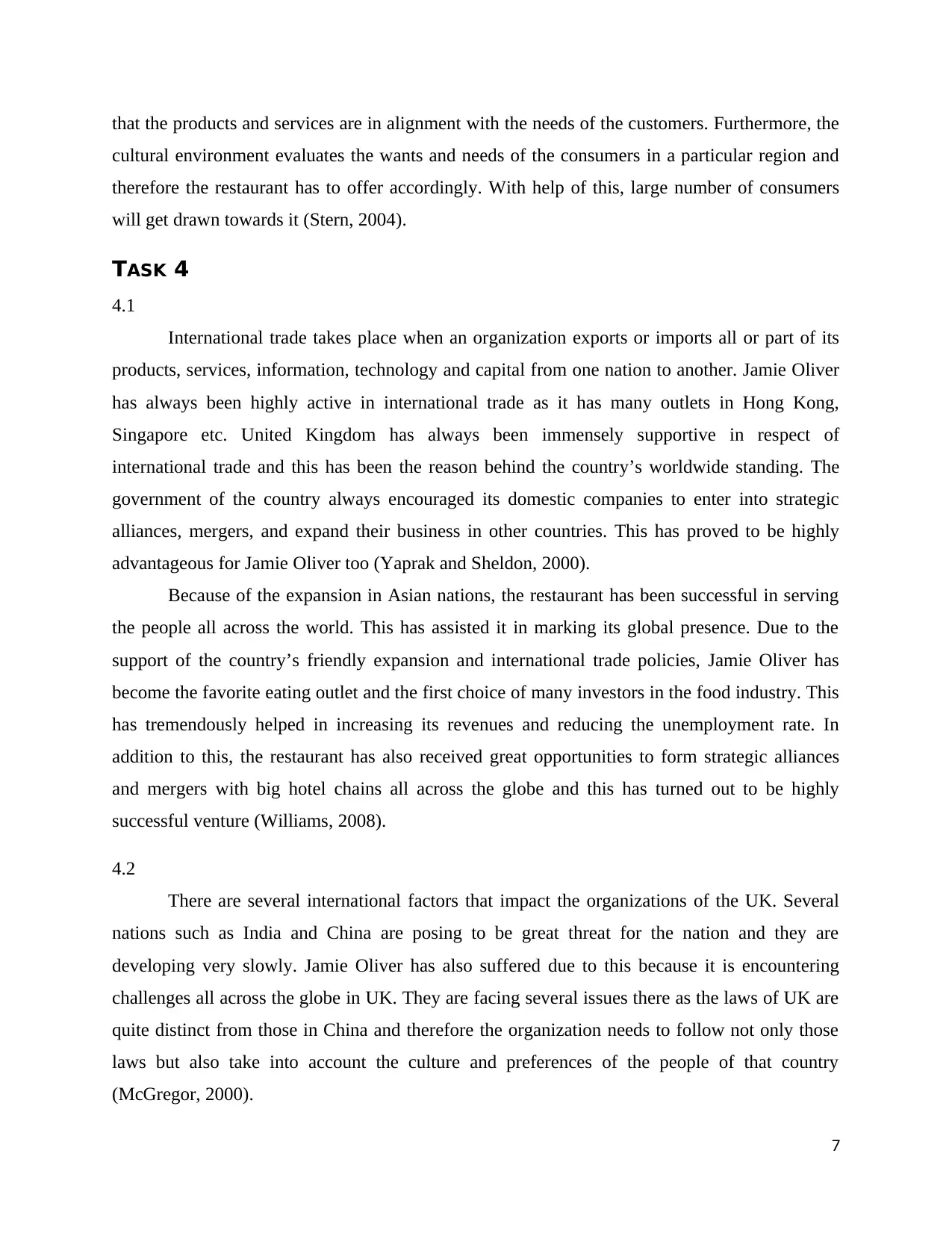
that the products and services are in alignment with the needs of the customers. Furthermore, the
cultural environment evaluates the wants and needs of the consumers in a particular region and
therefore the restaurant has to offer accordingly. With help of this, large number of consumers
will get drawn towards it (Stern, 2004).
TASK 4
4.1
International trade takes place when an organization exports or imports all or part of its
products, services, information, technology and capital from one nation to another. Jamie Oliver
has always been highly active in international trade as it has many outlets in Hong Kong,
Singapore etc. United Kingdom has always been immensely supportive in respect of
international trade and this has been the reason behind the country’s worldwide standing. The
government of the country always encouraged its domestic companies to enter into strategic
alliances, mergers, and expand their business in other countries. This has proved to be highly
advantageous for Jamie Oliver too (Yaprak and Sheldon, 2000).
Because of the expansion in Asian nations, the restaurant has been successful in serving
the people all across the world. This has assisted it in marking its global presence. Due to the
support of the country’s friendly expansion and international trade policies, Jamie Oliver has
become the favorite eating outlet and the first choice of many investors in the food industry. This
has tremendously helped in increasing its revenues and reducing the unemployment rate. In
addition to this, the restaurant has also received great opportunities to form strategic alliances
and mergers with big hotel chains all across the globe and this has turned out to be highly
successful venture (Williams, 2008).
4.2
There are several international factors that impact the organizations of the UK. Several
nations such as India and China are posing to be great threat for the nation and they are
developing very slowly. Jamie Oliver has also suffered due to this because it is encountering
challenges all across the globe in UK. They are facing several issues there as the laws of UK are
quite distinct from those in China and therefore the organization needs to follow not only those
laws but also take into account the culture and preferences of the people of that country
(McGregor, 2000).
7
cultural environment evaluates the wants and needs of the consumers in a particular region and
therefore the restaurant has to offer accordingly. With help of this, large number of consumers
will get drawn towards it (Stern, 2004).
TASK 4
4.1
International trade takes place when an organization exports or imports all or part of its
products, services, information, technology and capital from one nation to another. Jamie Oliver
has always been highly active in international trade as it has many outlets in Hong Kong,
Singapore etc. United Kingdom has always been immensely supportive in respect of
international trade and this has been the reason behind the country’s worldwide standing. The
government of the country always encouraged its domestic companies to enter into strategic
alliances, mergers, and expand their business in other countries. This has proved to be highly
advantageous for Jamie Oliver too (Yaprak and Sheldon, 2000).
Because of the expansion in Asian nations, the restaurant has been successful in serving
the people all across the world. This has assisted it in marking its global presence. Due to the
support of the country’s friendly expansion and international trade policies, Jamie Oliver has
become the favorite eating outlet and the first choice of many investors in the food industry. This
has tremendously helped in increasing its revenues and reducing the unemployment rate. In
addition to this, the restaurant has also received great opportunities to form strategic alliances
and mergers with big hotel chains all across the globe and this has turned out to be highly
successful venture (Williams, 2008).
4.2
There are several international factors that impact the organizations of the UK. Several
nations such as India and China are posing to be great threat for the nation and they are
developing very slowly. Jamie Oliver has also suffered due to this because it is encountering
challenges all across the globe in UK. They are facing several issues there as the laws of UK are
quite distinct from those in China and therefore the organization needs to follow not only those
laws but also take into account the culture and preferences of the people of that country
(McGregor, 2000).
7
⊘ This is a preview!⊘
Do you want full access?
Subscribe today to unlock all pages.

Trusted by 1+ million students worldwide
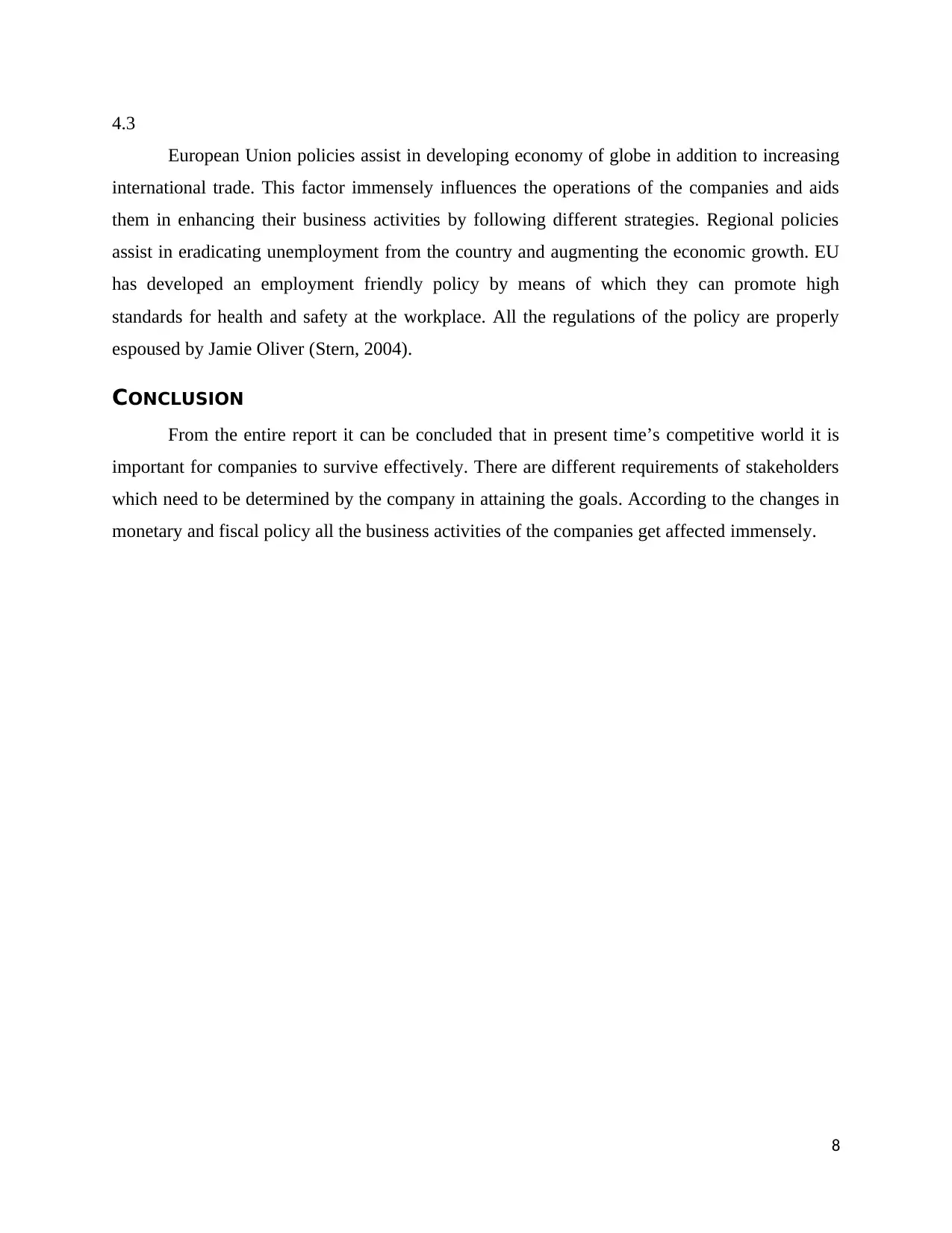
4.3
European Union policies assist in developing economy of globe in addition to increasing
international trade. This factor immensely influences the operations of the companies and aids
them in enhancing their business activities by following different strategies. Regional policies
assist in eradicating unemployment from the country and augmenting the economic growth. EU
has developed an employment friendly policy by means of which they can promote high
standards for health and safety at the workplace. All the regulations of the policy are properly
espoused by Jamie Oliver (Stern, 2004).
CONCLUSION
From the entire report it can be concluded that in present time’s competitive world it is
important for companies to survive effectively. There are different requirements of stakeholders
which need to be determined by the company in attaining the goals. According to the changes in
monetary and fiscal policy all the business activities of the companies get affected immensely.
8
European Union policies assist in developing economy of globe in addition to increasing
international trade. This factor immensely influences the operations of the companies and aids
them in enhancing their business activities by following different strategies. Regional policies
assist in eradicating unemployment from the country and augmenting the economic growth. EU
has developed an employment friendly policy by means of which they can promote high
standards for health and safety at the workplace. All the regulations of the policy are properly
espoused by Jamie Oliver (Stern, 2004).
CONCLUSION
From the entire report it can be concluded that in present time’s competitive world it is
important for companies to survive effectively. There are different requirements of stakeholders
which need to be determined by the company in attaining the goals. According to the changes in
monetary and fiscal policy all the business activities of the companies get affected immensely.
8
Paraphrase This Document
Need a fresh take? Get an instant paraphrase of this document with our AI Paraphraser
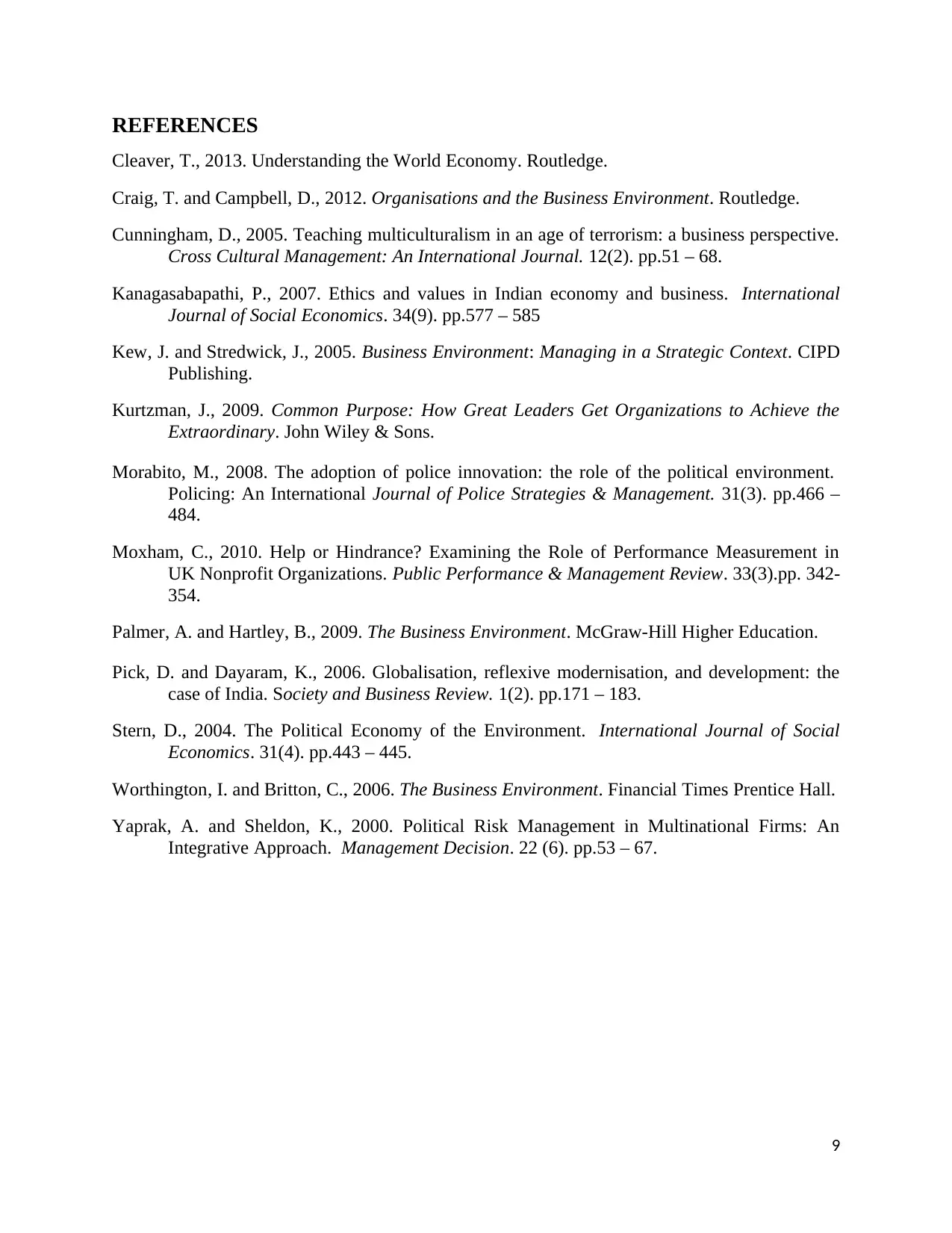
REFERENCES
Cleaver, T., 2013. Understanding the World Economy. Routledge.
Craig, T. and Campbell, D., 2012. Organisations and the Business Environment. Routledge.
Cunningham, D., 2005. Teaching multiculturalism in an age of terrorism: a business perspective.
Cross Cultural Management: An International Journal. 12(2). pp.51 – 68.
Kanagasabapathi, P., 2007. Ethics and values in Indian economy and business. International
Journal of Social Economics. 34(9). pp.577 – 585
Kew, J. and Stredwick, J., 2005. Business Environment: Managing in a Strategic Context. CIPD
Publishing.
Kurtzman, J., 2009. Common Purpose: How Great Leaders Get Organizations to Achieve the
Extraordinary. John Wiley & Sons.
Morabito, M., 2008. The adoption of police innovation: the role of the political environment.
Policing: An International Journal of Police Strategies & Management. 31(3). pp.466 –
484.
Moxham, C., 2010. Help or Hindrance? Examining the Role of Performance Measurement in
UK Nonprofit Organizations. Public Performance & Management Review. 33(3).pp. 342-
354.
Palmer, A. and Hartley, B., 2009. The Business Environment. McGraw-Hill Higher Education.
Pick, D. and Dayaram, K., 2006. Globalisation, reflexive modernisation, and development: the
case of India. Society and Business Review. 1(2). pp.171 – 183.
Stern, D., 2004. The Political Economy of the Environment. International Journal of Social
Economics. 31(4). pp.443 – 445.
Worthington, I. and Britton, C., 2006. The Business Environment. Financial Times Prentice Hall.
Yaprak, A. and Sheldon, K., 2000. Political Risk Management in Multinational Firms: An
Integrative Approach. Management Decision. 22 (6). pp.53 – 67.
9
Cleaver, T., 2013. Understanding the World Economy. Routledge.
Craig, T. and Campbell, D., 2012. Organisations and the Business Environment. Routledge.
Cunningham, D., 2005. Teaching multiculturalism in an age of terrorism: a business perspective.
Cross Cultural Management: An International Journal. 12(2). pp.51 – 68.
Kanagasabapathi, P., 2007. Ethics and values in Indian economy and business. International
Journal of Social Economics. 34(9). pp.577 – 585
Kew, J. and Stredwick, J., 2005. Business Environment: Managing in a Strategic Context. CIPD
Publishing.
Kurtzman, J., 2009. Common Purpose: How Great Leaders Get Organizations to Achieve the
Extraordinary. John Wiley & Sons.
Morabito, M., 2008. The adoption of police innovation: the role of the political environment.
Policing: An International Journal of Police Strategies & Management. 31(3). pp.466 –
484.
Moxham, C., 2010. Help or Hindrance? Examining the Role of Performance Measurement in
UK Nonprofit Organizations. Public Performance & Management Review. 33(3).pp. 342-
354.
Palmer, A. and Hartley, B., 2009. The Business Environment. McGraw-Hill Higher Education.
Pick, D. and Dayaram, K., 2006. Globalisation, reflexive modernisation, and development: the
case of India. Society and Business Review. 1(2). pp.171 – 183.
Stern, D., 2004. The Political Economy of the Environment. International Journal of Social
Economics. 31(4). pp.443 – 445.
Worthington, I. and Britton, C., 2006. The Business Environment. Financial Times Prentice Hall.
Yaprak, A. and Sheldon, K., 2000. Political Risk Management in Multinational Firms: An
Integrative Approach. Management Decision. 22 (6). pp.53 – 67.
9
1 out of 11
Related Documents
Your All-in-One AI-Powered Toolkit for Academic Success.
+13062052269
info@desklib.com
Available 24*7 on WhatsApp / Email
![[object Object]](/_next/static/media/star-bottom.7253800d.svg)
Unlock your academic potential
Copyright © 2020–2026 A2Z Services. All Rights Reserved. Developed and managed by ZUCOL.




